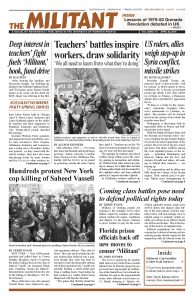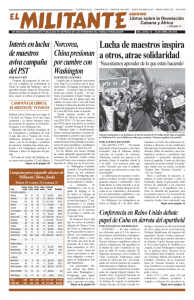April 26, 1993
Some important local fights by miners are unfolding in West Virginia and Indiana. Miners at Buck Creek, the largest underground mine in Indiana, went on strike April 1 because of the company’s failure to negotiate a contract with them. The Sullivan, Indiana, miners voted in October 1991 to join the UMWA. Since then, negotiations on a basic union contract have gone nowhere.
The miners at the Ziegler Coal Company’s Marrowbone complex in Mingo County, West Virginia, have won another round against the company in their fight to bring the union into their mine.
Four hundred workers there walked off the job March 24 after the company announced cuts in benefits and bonuses. Four miners were fired. The other workers then went on strike until April 2, when the company agreed to reverse the firings. Almost 400 of 435 miners signed union representation cards.
April 22, 1968
You see many things in Cuba that make you understand that this is an island under siege, where the people sacrifice and work hard to carry through with their stubborn plan to develop their country despite the U.S.-created obstacles.
There are also other sides of Cuba — sides of Cuba that are so lovely that they almost take your breath away. When you see them, you find it difficult to remember that this is a blockaded fortress. You get a glimpse of the future society. One such thing is Cubanacan, Cuba’s National School of the Arts.
There are 600 full-time students at the school, which opened in 1962. The age level varies with the art form. Ballet and modern dance students are taken from the age of eight. The age for musicians varies with the instrument. Tuition, including room and board, is absolutely free.
April 24, 1943
DETROIT, April 17 — Over 10,000 Negro and white workers marched to Cadillac Square last Sunday afternoon to hold a mass demonstration against Negro discrimination. The march and meeting were sponsored by the Detroit branch of the National Association for the Advancement of Colored People in cooperation with the CIO United Auto Workers and Negro fraternal groups. There was also a small contingent of Negro soldiers who spontaneously stepped into the line of march as the parade swept by a Negro USO center.
Most of the speakers protested against job discrimination in war plants, police brutality, refusal to serve Negroes in Detroit restaurants, failure to give Negro women jobs to which their skill entitles them, the defeat of anti-poll tax legislation by Democrats and Republicans, Jim Crow housing. Some of the placards demanded freedom for India.

